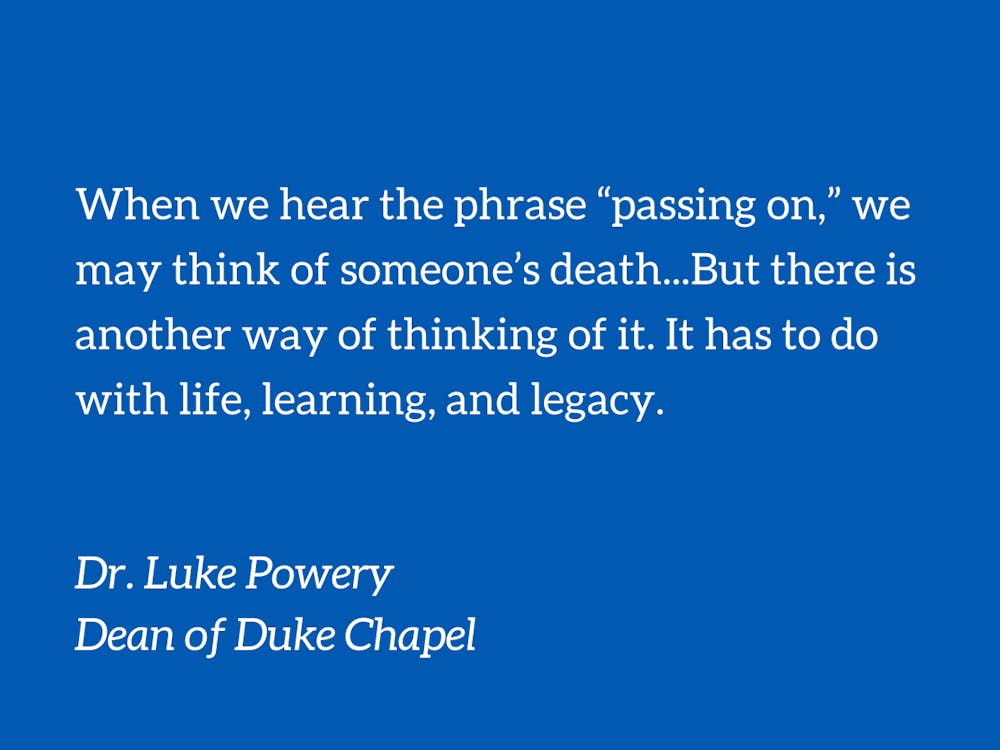When we hear the phrase “passing on,” we may think of someone’s death. This is certainly one meaning of the phrase, but there is another way of thinking of it. It has to do with life, learning, and legacy. That is, even if someone has “passed on” as in death, they may have also “passed on” something to those who are left behind.
Dr. Karla FC Holloway, James B. Duke Distinguished Professor Emerita of English, writes about “passing on” in her book “Passed On: African American Mourning Stories,” which explores death and dying in African America. This phrase implies that a person has “passed on” to another place or reality, not on earth. They have passed us by, perhaps, and taken flight or “crossed over the Jordan river.” This way of framing the phrase pertains to death normally and a type of finality, although using the word “passing” is different from saying someone “died.” The former could also suggest they are alive elsewhere.
I’ve been thinking about this lately, not because of recent deaths, but because of a letter I read. It is a letter in the Bible that has been called a “last testament” of the Apostle Paul. In this letter to a younger disciple named Timothy, Paul says, “I am reminded of your sincere faith, a faith that lived first in your grandmother Lois and your mother Eunice and now, I am sure, lives in you.” With these words, Paul is encouraging Timothy not to forget what has been passed on to him from his grandmother and mother.
This valuable treasure of faith that Timothy receives is not a grand institutional legacy; instead, it is an intimate family legacy from a grandmother to a mother to a son. Lois and Eunice—mentioned by name nowhere else in the Bible—they “passed on” to Timothy. It was a quiet transmission, but it greatly affected the life of this young man.
I notice also that it was two women who transmitted this gift to Timothy. It is an example of the key role of women in the church, which sociologist Cheryl Townsend Gilkes writes about in her book “If It Wasn’t for the Women.” It is something I have seen in my life. A beloved harmonica was passed on to me from my mother who received it from my aunt, her sister, when my grandmother was dying in 1975. For me, as I have written about here, the instrument represents a legacy of music, family, and faith that was passed on to me by my mother.
Who has “passed on” to you? It may not be a mother, but it could be a father, coach, teacher, friend, or a co-worker. It could be a cousin or uncle. What did they pass on to you? A love of reading? Gardening skills? An inclination to say “thank you” to the cook after every meal? A genuine care for animals? A heart for justice?
As you think about “passing on” in your life, remember that it doesn’t have to be flashy or loud or even a TikTok trend. Often, it is not very visible or especially formal. It can be more “caught” than “taught.” Lois and Eunice may well have passed on their faith to Timothy simply by embodying it with sincerity and dignity. Whatever means they used, they clearly “passed on” across the generations, person to person. Timothy, then, continued this legacy in his life by passing it on to others.
How are you passing on what you’ve received from others? What kind of legacy will you leave?
The Rev. Dr. Luke A. Powery is Dean of Duke University Chapel. His column runs on alternate Mondays.
Get The Chronicle straight to your inbox
Signup for our weekly newsletter. Cancel at any time.

